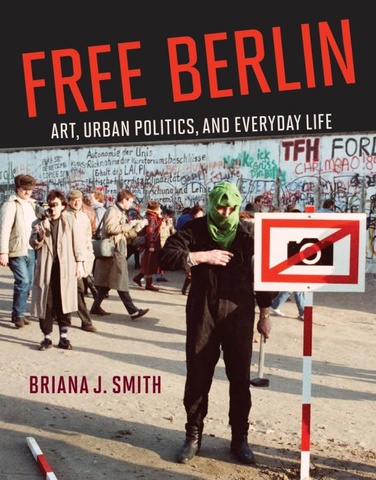Iowa City, Iowa; Berlin, Germany; and now Cambridge, Massachusetts. Briana Smith has called a number of places home over the past decade; but it was her decision to attend the University of Iowa, and call Iowa City home for a time, which set her on a trajectory to publish her first book, coming out on August 30, 2022.

“The path that led me to where I am now started in Iowa City when I decided to get a PhD in history at the University of Iowa,” said Smith. “In my program, I worked alongside Lisa Heineman [professor of history in the UI College of Liberal Arts and Sciences] and knew I wanted to conduct research related to German history. It was a series of grants from UI International Programs that got me my first trip to Berlin during my PhD program to do research in archives for my thesis connected to East German television.”
The recipient of a 2012 Stanley Graduate Award for International Research, a 2013 Fulbright Study/Research awardee, 2013-2014 German Academic Exchange Service (DAAD) Graduate Research Scholarship winner, and a 2013 Berlin Program for Advanced German and European Studies Fellowship, Smith attributes many of her successes to her time at Iowa and the support she received from faculty mentors in the UI History Department, International Programs staff, and the generous funding that made her global research experiences possible.
“My initial research at Iowa is the foundation for my upcoming book,” said Smith. “Coming into graduate school, I didn’t have my own funds to send myself to Germany, so the Stanley Award enabled me to travel, live in the city, and gain access to archives in Berlin. My dissertation was devoted to the topic of experimental art in Berlin from 1971 to the late 1990s, after the fall of the Berlin Wall, and the award was essential to my dissertation, my subsequent book, and to my future as a researcher and a historian.”
Briana during her first trip to Berlin in summer 2014, funded with a Stanley Grant
Since graduating from Iowa with a PhD in 2017, Smith spent a year teaching as a visiting assistant professor at Iowa before moving east. Smith is currently a lecturer and assistant director of studies in the Committee on Degrees in History and Literature at Harvard University. Drawing on lessons she learned while working with International Programs staff at Iowa, Smith has continued pursuing research and grant opportunities to further her development as a historian and this fall, Smith’s book, Free Berlin: Art, Urban Politics, and Everyday Life, is set to be published by the MIT Press.
“It examines divided Berlin as the unlikely site of artistic experimentation in the late Cold War period,” said Smith. “It identifies ways that artists promoted new ways for how Berliners could interact with both art and politics in urban space in both East and West Berlin and in the Post-Wall city, and modeled a more participatory form of urban civic and creative life.”

Smith worked with Karen Wachsmuth, associate director of international fellowships in UI International Programs, to apply for internal and external funding opportunities to support her dissertation work in her PhD program.
“Working with Karen, I learned how to successfully write grant applications, how to write statements of purpose, and how to frame a project that would make sense to those reviewing funding applications,” said Smith. “Starting out at Iowa, I didn’t have those skills myself. It was a transformational and an empowering experience to start with applying for the Stanley award, travel to Berlin, fall in love with archival research, and then move on to applying for a bigger award like the Fulbright. All the resources and support available through International Programs made what was abstract (dreaming of going abroad), a reality (actually doing it).”
Looking ahead, Smith is focusing on publishing her first book then moving forward with a new project.
“My next book project is a cultural history of the computerization of Germany, which explores the role of everyday computer users in Cold War and post-Wall Germany, and how they shaped society and politics both on and offline,” said Smith. “This next research project will require more archival research and therefore more funding. I will apply the grant writing skills I’ve acquired over the years at Iowa to seek additional funding support to return to Germany to complete the research for this second book.”